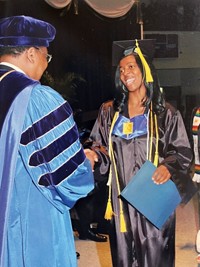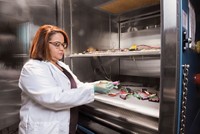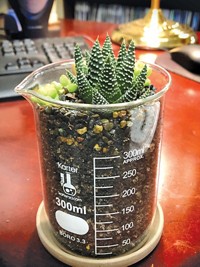Advertisement
Grab your lab coat. Let's get started
Welcome!
Welcome!
Create an account below to get 6 C&EN articles per month, receive newsletters and more - all free.
It seems this is your first time logging in online. Please enter the following information to continue.
As an ACS member you automatically get access to this site. All we need is few more details to create your reading experience.
Not you? Sign in with a different account.
Not you? Sign in with a different account.
ERROR 1
ERROR 1
ERROR 2
ERROR 2
ERROR 2
ERROR 2
ERROR 2
Password and Confirm password must match.
If you have an ACS member number, please enter it here so we can link this account to your membership. (optional)
ERROR 2
ACS values your privacy. By submitting your information, you are gaining access to C&EN and subscribing to our weekly newsletter. We use the information you provide to make your reading experience better, and we will never sell your data to third party members.
Women In Science
Amazing Women
Project SEED scholar Tiffany Adams
Scholarship opens door to a series of career-boosting placements and awards
by Alex Scott
August 26, 2018
| A version of this story appeared in
Volume 96, Issue 34

Tiffany Adams wonders if she would ever have become a senior program manager, the role she is in today for global chemical and instrument maker Thermo Fisher Scientific, if it hadn’t been for the Project SEED scholarship she earned in high school in the 1990s. The summer research experience led to a series of meetings with mentors who went the extra mile—renowned scientists who showed her how rewarding chemistry and biochemistry could be—and placements with companies that set her toward a career in industrial chemistry.
Vitals
▸ Hometown:Washington, D.C.
▸ Year in Project SEED:1996
▸ Education:B.S., chemistry, Virginia Union University; M.S., biochemistry, Georgetown University; M.B.A., Johns Hopkins University
▸ Current position:Senior program manager, Thermo Fisher Scientific
▸ Advice for students:“Never allow anyone to put you or your scientific career in a box. The world is full of exploration; search until you find the opportunity that will allow you to put your fingerprint on the world.”
It was Ellen Hefner, a high school chemistry teacher in Winston-Salem, N.C., who spotted Adams’s aptitude for science and in 11th grade and put her forward for Advanced Placement chemistry. Adams’s school counselor subsequently looked for internships or scholarships and suggested she apply for the ACS Project SEED scholarship, which Adams was selected for. She then spent the summer at Wake Forest University completing her research project.
Once at the university, Adams attended organic chemistry lectures and came under the mentorship of Richard A. Manderville, who at the time was an assistant professor of chemistry. Adams was exposed to technologies such as nuclear magnetic resonance spectroscopy and began running samples in Manderville’s lab. She was the only high school pupil in the lab but recalls thriving on the experience. “Building things mathematically made sense,” Adams says.
A year later and still in high school, Adams followed the experience with Advanced Placement biology. “But I wasn’t as impressed,” she says.
The next summer, Adams approached Manderville to see whether there were more opportunities in his lab to learn about chemistry. There weren’t.
But in a move that Adams counts as one of those life-changing moments in her life, Manderville made some calls and secured Adams a summer placement with the Bowman Gray School of Medicine, now the Wake Forest School of Medicine. It was there that Adams got a taste of analytical chemistry and got her hands on the likes of high-performance liquid chromatography equipment and gas chromatographs.
Adams went on to study chemistry and earn a bachelor’s degree from Virginia Union University. While in college, she participated in the ACS Scholars Program, which gave her an opportunity to do summer research at PPG.
Adams recalls one occasion when PPG flew her to Louisiana to visit one of its major chemical complexes. “I was able to see things on a whole different level, to see things scaled up. It was just amazing,” Adams says.
During her senior year in college, Adams did research at Whitehall-Robins Healthcare in Richmond, Va. There, Adams worked on tablet formulations to optimize the distribution of ingredients.
In 2001, while still in college, Adams earned a scholarship from the National Institutes of Health, which gave her an opportunity to do research in biochemistry and toxicology. While at NIH, Adams was mentored by Peng Loh.
But Adams’s run of progress stalled when she was hit with an illness, which caused her to miss the application deadlines for chemistry Ph.D. programs.
After some soul searching, Adams enrolled in a master’s program in biochemistry at Georgetown University. The program was flexible enough to allow her to complete a one-year internship back at Loh’s lab.
Advertisement
With an M.S. degree under her belt, Adams had a long conversation with her mentor, Jack G. Chirikjian, a biochemist at Georgetown University, about her career path. He could see Adams had a passion for industry and advised her to build her understanding of business. “That’s why I went for an M.B.A.,” Adams says.
True to form, Adams combined her M.B.A. with a job: She took a role as a senior quality-control chemist for German lab sample and assay technology provider Qiagen before becoming a senior operational product manager with the firm.

For the past two years, Adams has been with Thermo Fisher Scientific, where she is a senior program manager, with responsibilities that include rolling out new products and providing monthly financial reports. Adams doesn’t feel she has ditched science for business, though, and says she constantly uses the scientific knowledge she gained from her various jobs and placements. “I would describe myself as a businesswoman infused with science,” she says.
Despite her ambition and drive, Adams’s hunch is still that if she hadn’t met Manderville, who helped set her on her way to various placements and scholarships, her journey would have been very different, and almost certainly less rewarding.





Join the conversation
Contact the reporter
Submit a Letter to the Editor for publication
Engage with us on Twitter